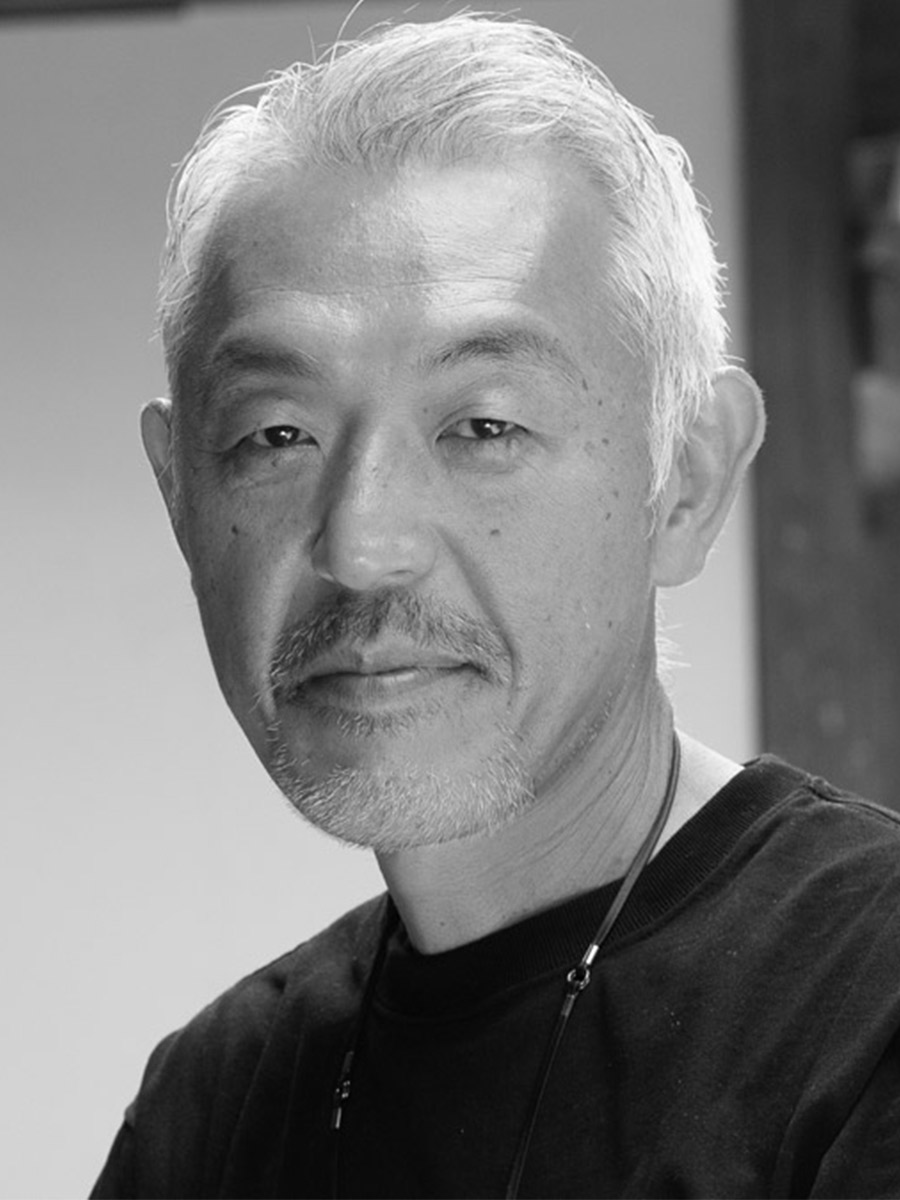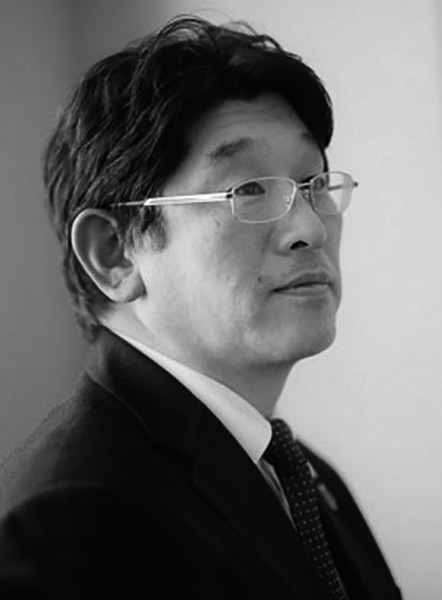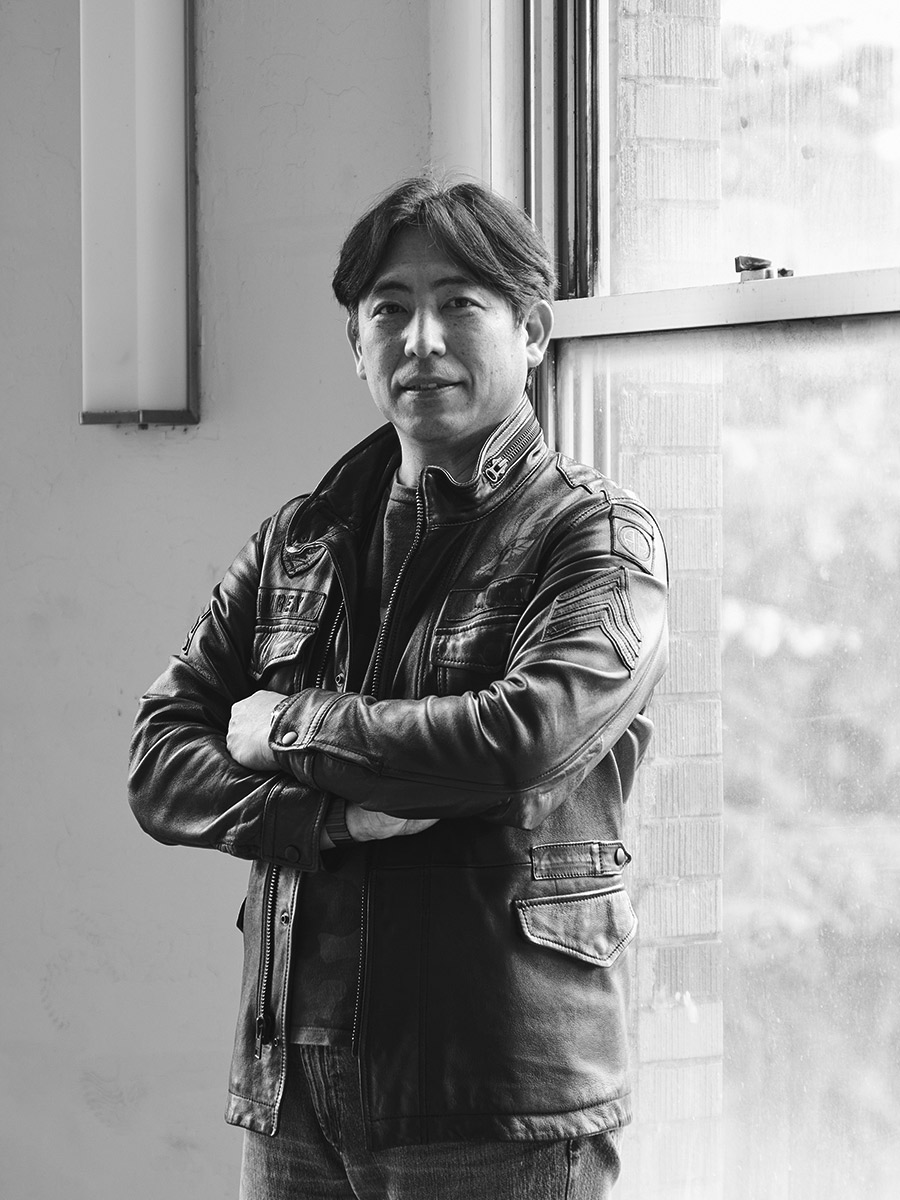
Mitsuo Harada
Production Designer/YOIHI PROJECT Representative
Born in 1965. As a production designer, he has collaborated with Junji Sakamoto and many other leading Japanese film directors.
- Orokamono: Kizudarake no Tenshi (1998, Directed by Junji Sakamoto)
- Face (2000, Directed by Junji Sakamoto )
- Zawazawa Shimokitazawa (2000, Directed by Jun Ichikawa)
- The 55th Mainichi Film Awards, Best Art Direction
- The 20th Fujimoto Film Awards Special Prize
- Aegis (2005, Directed by Junji Sakamoto)
- The 29th Japan Academy Film Prize, Outstanding Achievement in Art Direction
- TOKYO TOWER -Mom & Me, and Sometimes Dad- (2007, Directed by Joji Matsuoka)
- The 31th Japan Academy Film Prize, Outstanding Achievement in Art Direction
- Thermae Romae (2012, Directed by Hideki Takeuchi) /
A Chorus of Angels (2012, Directed by Junji Sakamoto)- The 36th Japan Academy Film Prize, Outstanding Achievement in Art Direction
- The Great Passage (2013, Directed by Yuya Ishii)
- The 37th Japan Academy Film Prize, Outstanding Achievement in Art Direction
- The 68th Mainichi Film Awards, Best Art Direction
- Unforgiven (2013, Directed by Sang-il Lee)
- The 37th Japan Academy Film Prize, Outstanding Achievement in Art Direction
- TOKYO! (SHAKING TOKYO) (2008, Directed by Bong Joon Ho)
- Thermae Romae II (2014, Directed by Hideki Takeuchi)
- The Vancouver Asahi (2014, Directed by Yuya Ishii)
- Midnight Diner (2015, Directed by Joji Matsuoka)
- Samurai’s Promise (2018, Directed by Daisaku Kimura)
- Every Day a Good Day (2018, Directed by Tatsushi Omori)
- Another World (2019, Directed by Junji Sakamoto)
- Aircraft Carrier Ibuki (2019, Directed by Setsuo Wakamatsu)
- I Never Shot Anyone (2020, Directed by Junji Sakamoto )
- Ototo to Android to Boku (2022, Directed by Junji Sakamoto)
It is initiated by Japan’s leading production designer Mitsuo Harada.
Mitsuo Harada is an exceptional filmmaker, who uses art to express movie characters from their backgrounds and even to the shadows in their hearts.
Harada, who has worked with distinguished film directors as a production designer, now tackles this project beyond the framework of his career. As a filmmaker and an individual person, he will send a message to the next generation through craftsmanship with a vision.
Those of us who live ordinary lives have no idea of what to change and how to practice, as we see how the whole world turns its wheels all at once toward a sustainable society. We can’t even picture how those behaviors would make us happy.
What we want to create with YOIHI PROJECT is movies depicting humans, touching on various environmental issues, including bioeconomy, circular economy, sustainability, or SDGs. We want such films or projects to be the starting point for people to be interested in environmental issues and take time to think about it. Through our films, we want to pass on messages or treasures to the next generation, thus create a soil where each person receiving them seeks knowledge proactively and further pass on to the following generation.
What would our descendants think when they saw movies created through YOIHI PROJECT 100 years later? Just thinking about that thrills my heart.
YOIHI PROJECT is a revolution in which we make film with a future vision and convey the idea to people.
As one, we will connect this to our future.

Yoshiyuki Fujishima
Technology Innovation Director of YOIHI PROJECT
Acquired a D.Phill. in Organic Chemistry at the University of Oxford.
He became a researcher at Oxford Centre for Molecular Sciences in 1992.
From 1995, he worked in health, nutrition, and food processing at Ajinomoto Co. Inc.’s Central Research Laboratories, Food Research Laboratories, and Institute of Life Science Laboratories. He was involved in new business development at R&D Planning Department, Health Business Development Department, and Ajinomoto North America. On loan to Japan Bioindustry Association and New Energy and Industrial Technology Development Organization (NEDO), he took part in international bioeconomy and circular economy meetings.
He was appointed as the technology innovation director for YOICHI PROJECT from March 2022, and resigned from Ajinomoto Co. Inc. at the end of 2022.
What is bioeconomy?
What are the issues? What do we have to do?
The bioeconomy has been publicly discussed in Europe since around 2005. It spread worldwide through OECD reports in 2009, and Japan started building strategies. It is about realizing de-carbonization and building a sustainable society. But how do we pursue such economic activity, and who benefits from it? Does Japan have to follow western logic in the first place?
The problems in the discussion are dependence on fossil resources which traces its origin back to the Industrial Revolution in western world, the pursuit of productivity and the issue of waste, the spread of plague at the expense of biodiversity, poverty, or individuals sacrificed for the sake of loyalty to organizations. But in the end, overpopulating the earth created all these challenges, and it all happened because people have forgotten that co-existence with nature is fundamental.
In the book of Genesis in the Old Testament, there is a text that says, “Be fruitful and increase in number; fill the earth and subdue it. Rule over the fish in the sea and the birds in the sky and over every living creature that moves on the ground.” I hear that this is taught not only in Christianity but also in Judaism and Islam. I cannot help but have an impression that humans are the center of the universe and that they are to control everything in it. People who believe in this are the ones who dominate the arguments in the world and make rules. On the other hand, the Japanese people who are not so individualistic believe that humans are born good and try to put on their best behavior. Even though we naively obey the rules of the world without objecting, we also make monetary contributions when asked, not wanting to disturb the “harmony,” fight to defend if tricked into war, yet succumb to reparation even if there’s no basis, and import oil as requested by oil-producing nations.
Japan cultivated its unique culture of symbiosis with nature during the long period of seclusion policy, and about 30 million people lived in sustainable lifestyle until the Edo period without depending on fossil resources. In the city of Edo, over one million people had access to water and sewage services. Though its population has quadrupled since then, with the current knowledge, it may be possible to do without fossil resources. Maybe it is time to make full use of the trees planted right after World War II as part of war recovery.
Basing our lives on symbiosis with nature, using its ingenuity in humility as its virtue, maybe that’s something only Japan is capable of doing it as human nature.
Or maybe all we want to protect is kids playing innocently in the sea or around the hills. Protect the nature we have inherited from our ancestors. As Navajo Indians cleverly say, we borrow the earth from our children. We, the adults, must conduct ourselves in such ways that are not shameful before our children.

Kiyohiko Igarashi
Project Fellow of YOIHI PROJECT
Kiyohiko Igarashi is a professor of biomaterial sciences at the Graduate School of Agricultural and Life Sciences at the University of Tokyo. He was born in Yamaguchi Prefecture in 1971. Only a half year later, he and his family moved to Tokyo, to Ishikawa Prefecture in his first year in kindergarten, to Osaka in his fourth grade, and back to Tokyo in his seventh grade. He picked up various dialects, having moved from one city to another throughout Japan due to his father’s job transfers. He realized how essential it is to explore how humans should live between cities and nature while staying in Sweden after finishing his studies. Returning to Japan, he settled at the foot of Mt. Takao. In 2016, he started his research position in Finland. As he pursued the realization of a ‘bioecomony,’ an economic activity that does not place a heavy burden on the biosphere, he also established a One Earth Guardian Development Program at the University of Tokyo. Igarashi believes in the power of fungal enzymes and has put 25 years into research. He has authored over 200 papers for publications, including the U.S. Science Magazine and books, and has received multiple awards, including the Japan Society for the Promotion of Science Award and the Ichimura Foundation for New Technology Award. He even holds the Guinness World Record for enzyme research.
How can humans live without placing a burden on the earth?
As the whole world turns its wheel all at once toward the circular economy and the bioeconomy (an economic activity that does not burden the biosphere), I get frustrated and think, “What in the world is Japan doing?” As I analyze this frustration as a researcher would, I realize that the ways for humans to live without burdening the earth do exist in various regions of Japan quietly but definitely. I believe there are ways of living for humans to pass on to the next generation beyond a long and arduous journey of seeking the answers for how humans and the earth can coexist, pushing time forward rather than pushing it back.
Educational Background
- March 1994
- Graduated from the Department of Forest Product at the School of Agriculture, the University of Tokyo
- March 1996
- Completed MS in Forest Product Studies at the Graduate School of Agriculture, the University of Tokyo
- March 1999
- Completed a Doctor of Agriculture at the Graduate School of Agricultural and Life Sciences, the University of Tokyo
Temporary Researcher for Seven Months at the Department of Biochemistry and Molecular Biology
Job History
- April 1994
- The Japan Society for the Promotion of Science Research Fellow (PD)
One-year Postdoc Researcher at the Uppsala University Biomedical Centre (Sweden)
- April 2002
- Assistant at the Graduate School of Agricultural and Life Sciences, the University of Tokyo
- April 2007
- Assistant Professor at the Graduate School of Agricultural and Life Sciences, the University of Tokyo
- April 2009
- Associate Professor at the Graduate School of Agricultural and Life Sciences, the University of Tokyo
- April 2014 to March 2016
- The First Biology Committee Member for National Center for University Entrance Examination
- January 2016 to December 2019
- Visiting Professor of Finland Distinguished Professor (FiDiPro) Program at VTT Technical Research Center of Finland Ltd.
- August 2017 to July 2019
- Senior Scientific Research Specialist at Scientific Research Aid Division of Japanese Ministry of Education, Culture Sports, Science, and Technology Research Promotion Bureau
- April 2018 to Now
- Fellow at the Technology Strategy Center of New Energy and Industrial Technology Development Organization
- March 2021
- Professor at the Department of Biomaterials Sciences, the Graduate School of Agricultural and Life Sciences, the University of Tokyo